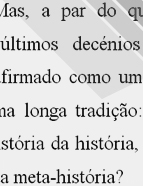

................................
A nunderlying question —and one that is present in various forms in the works of historians such as Magalhães Godinho, Barradas de Carvalho, and Joel Serrão—is the relationship between history, politics, and civic engagement. This issue is central to understanding liberal historiography itself. To what extent does the historian—whether acknowledg ing it or not—act as a citizen and remain permeable to doctrinal agendas? For Jaime Cortesão and other Republican historians of the early 20th century, the historian’s craft was inseparable from citizenship. It is therefore understandable that by the late 1960s, at a time when the cultural nationalism of the Estado Novo was in crisis, Joel Serrão recognised the political stance of historians in classifying historiographical trends ("Para uma perspectiva da historiografia portuguesa contemporânea " [" Towards a Perspective on Contemporary Portuguese Historiography " ] (1800–1940)," [undated [1971]), in a comprehensive perspective with a view to understanding contemporary Portuguese historiography. Serrão distinguished between liberal-inspired historiography, the interpretations of ecclesiastical historians who preceded Herculano (some associated with the Academy of Sciences), Republican historiography, and the traditionalist historiography that emerged after the First Republic, largely as a reaction against it. However, is it appropriate to classify historiographical trends based on more or less structured currents of political thought?
While it is a fact that political conceptualisations shaped the writing of history, it is equally evident that, in many cases, these frameworks are entirely insufficient to explain the uniqueness of a particular historical thought. Consider the notion of liberal historiography. A careful study of the various historians who may fall under this label points to significant divergences in their perspectives on the traditions surrounding the nation’s origins, as well as their concepts of povo (the people) and the Cortes (assemblies). For example, unlike Herculano, an advocate of a decentrali s ing ideology and one of the main theorists of a highly negative view of absolute monarchy, Luz Soriano believed that the Portuguese monarchy had always been representative rather than despotic, with deliberative assemblies. Similarly, regarding the mythical tradition of the Cortes of Lamego (a narrative invented based on a 17th-century apocryphal document), the two historians held differing views: Herculano denounced its falsehood, while Soriano highlighted its social functionality. Could there have been a master narrative or a liberal canon in 19th-century Portuguese historiography ? This is debatable. It may be more appropriate to refer to different narrative strategies within the framework of the liberal galaxy. However, it is true that within this galaxy, a memory was constructed by the victors of the Civil War (1832–34), which pitted the liberals, supporters of D. Pedro IV, against the absolutists, followers of D. Miguel. The memory of the defeated, by contrast, remained peripheral and did not produce any significant historical works (unlike what occurred in Spain).
